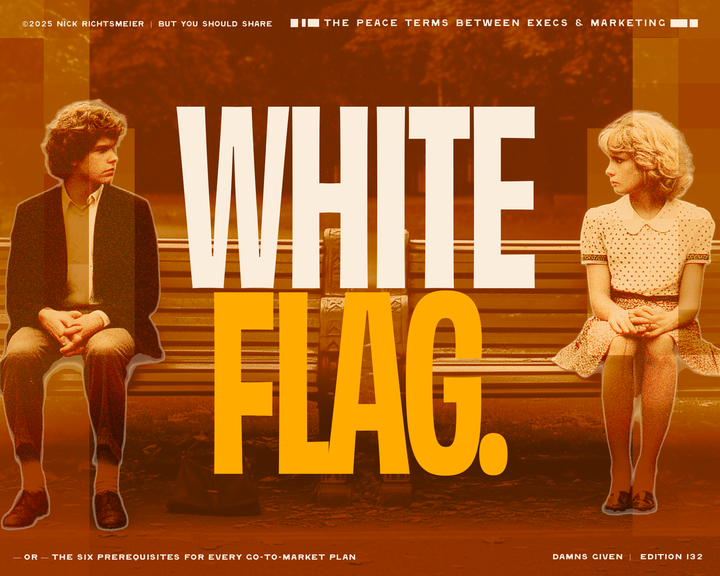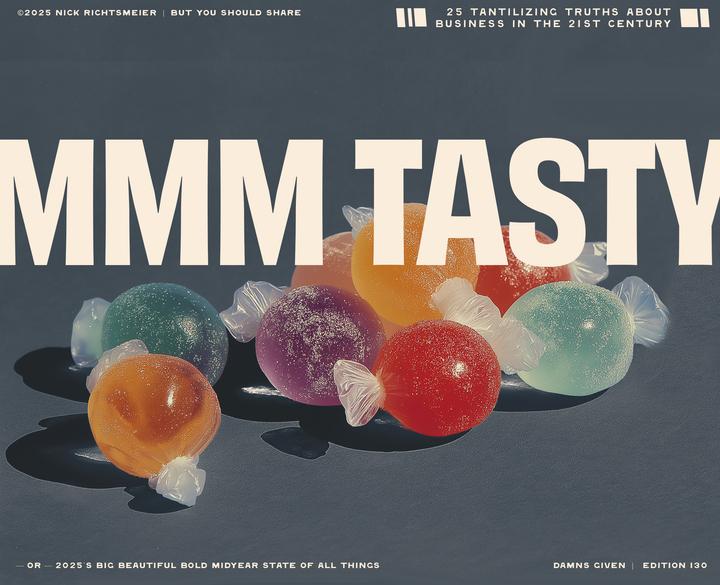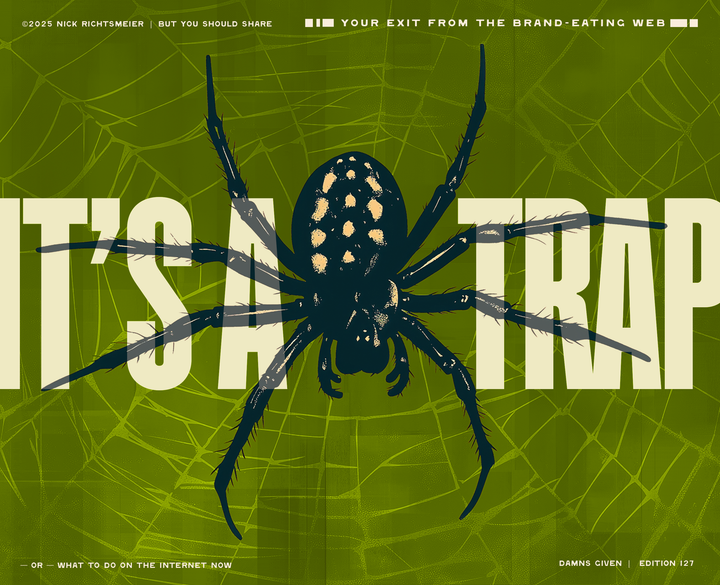Less Marketing, Less Tech
Marketing as we know it is collapsing—platforms like Google and Meta have outgrown their need for us, their bots ending the game of traffic. We must shift our focus, resist algorithm-driven inauthenticity by showing up as our real, human selves.

Edition 123 – OR – How Authenticity is Really the Only Way Forward
I thought for this week, as we continue to play with the structure of this newsletter and how it delivers the best value I can, I would highlight four conversations I'm having right now that inspire me right now and how you can be involved.
These conversations all point to a central theme: the power of surrender. The mind wanders to Stanley Tucci's "This IS a war!" from last year's now infamous film Conclave where he questions the logic of acting with our minds rather than brute force. As leaders hardened by so many hills to die on, we love a good fight. I get that. Surrender feels shitty.
But beyond movie clips, we should be drawn to one of the big lessons of the infamous Daniel Kahneman and Tversky material: The Sunk Cost Fallacy. It's so easy to think, "Well, we've gotten ourselves this far, we better stick with the horse that brung us." Particularly if that horse has the huge endorsement of industry talking heads or cultural pressure. We should MORE tech, not less. You can't grow without MORE marketing, and other delusions.
All of this more-ness ignores two big trends, trends that we can surrender to, freeing ourselves to actually move forward. First, marketing as it has been packaged to you is full of incentives, and digital structures that barely worked in their best eras and have been decimated by the AI era. Making more ads, more blogs, more social media, on more platforms to produce more clicks moving more traffic to your website that you're always adding more content too? A recipe in burning money. You need less marketing and probably less people to do it. Sorry team.
Tech is much the same story. Mid-market firms have been dragged into buying huge convoluted tech stacks with every piece doing another job with another API to another piece of data that requires another person to tend to, and all of sudden you have a house of cards that would probably invent flying cards if it had good data, but its so convoluted the data gets worse every year.
In the meantime, you've paid a tech tax in software costs and headcount that is upwards 5%, 10% of your gross revenue, keeping the Silicon Valley delusion alive, and funding VCs who are never going to fund you back.
You cannot win these uphill fights. You can surrender to them and the performance behavior and metrics they espouse. Once you've waived that White Flag you can move to what will actually grow your firm. More on that below.
1) We need fewer marketers.
I'm convinced that in five years 30% of the marketing workforce will be functionally working in another discipline. Digital marketing, as it was optimized for the 2018 web is an echo chamber of dying strategies and leaders across the board from SAAS to professional services expect results that the internet has no interest in giving.
I love marketers. They are often talented, creative, and solution-oriented, challenging many businesses to think beyond the tactical now. But their discipline sold itself to Google and Meta 15 years ago and now those platforms don't want or need them anymore. Things have to change.
I started a conversation about this on LinkedIn, you can join it here.
2) The future is offline.
Recent data now reports that over 50% of the activity on the web is bots. This used to be a funny dark web conspiracy called the "Dead Internet Theory." Now it's called Tuesday. But the battle for trust, for engagement, and for brand attention will have to go somewhere. In addition, the shifts in political and cultural values seek to remove one more bastion of the past - higher education - from the game board. We need places to find and build trust, the internet can't and won't do it anymore. We need places to think in interdisciplinary ways and grow citizens not workers, the university cannot scale (and is in fact descaling). We need to replatform the path to wisdom and integrative thinking. Where will it go?
I was inspired by that conversation and the interactions in created as well in this thread.
3) How do we build a better workforce?
The conventional wisdom now is that people don't need higher education (a premise I challenge, of course) because they'll just learn on the job. But job culture is on an efficiency tear where anything and anyone that doesn't produce ROI in the next five minutes is at risk. The systems and wisdom needed grow talent at work (training, managing, and mentoring) are often anemic. I dove deep on this topic with my colleague Brad on last week's episode of Working/Broken.
Apple Podcasts | Spotify | iHeart Radio | RSS Feed | Podcast Website
My apologies to those of you who got our Authenticity episode early, we linked the wrong one last week. It's corrected now.
Speaking of Authenticity...
4) Should we keep showing up as ourselves?
The shift in online recommendation algorithms to virality versus relationships, is wreaking havoc on who and how we show up online. The temptation to build a algorithmically-approved persona and game the machines to get the eyeballs you think you want is real.
The obvious side effect is that everyone is pretending. We've known this about social media for a while, but given the amount of time we're spending online and more apropos to business, the amount we imagine some magic social interaction is going to produce new business, the more this inauthenticity (with an AI overlay) is incentivized.
But authenticity, leading from a place of credible truth, is essential to growing trust. On the podcast, Brad and I came from very different perspectives on authenticity and the wrestling really inspired me in the newest episode of Working/Broken.
Apple Podcasts | Spotify | iHeart Radio | RSS Feed | Podcast Website



